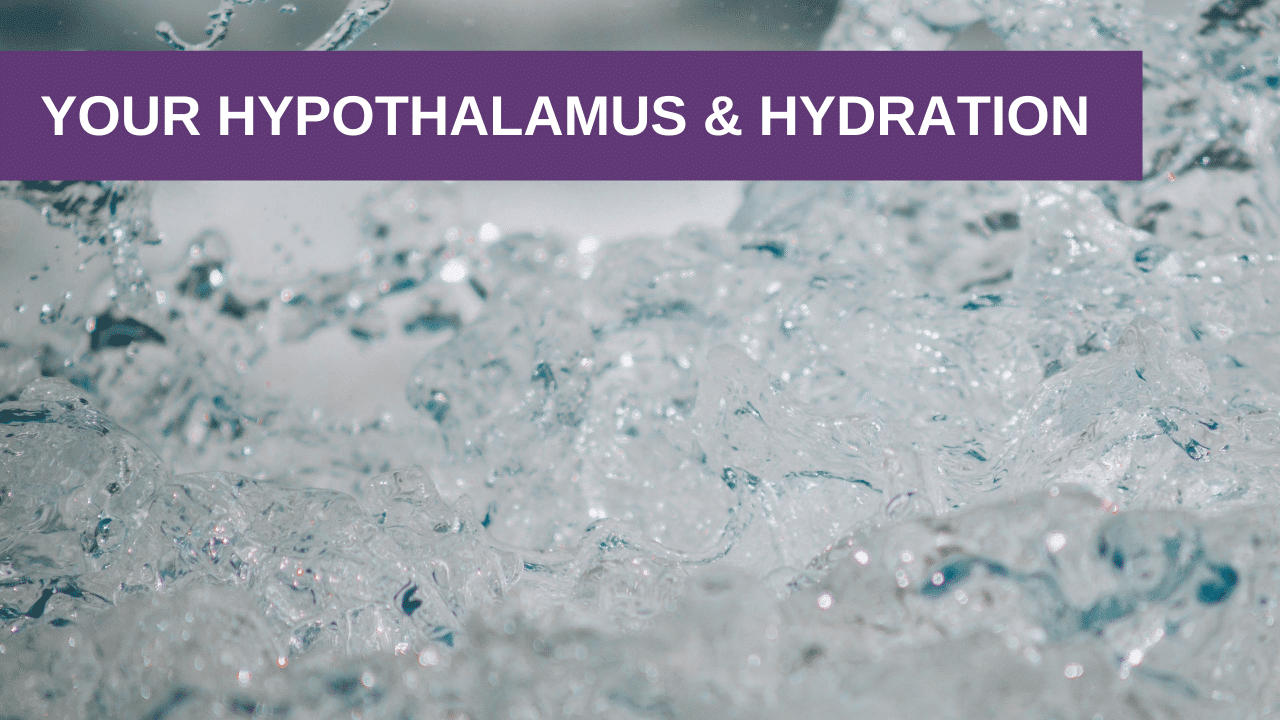Have you ever felt like you just can’t drink enough to quench your thirst? In spite of all the water you drink, your whole body seems as dry as a desert? And you long to feel hydrated again? If you drink lots of water and are still constantly thirsty, then you may have to reset your hypothalamus to help your hydration.
Most people require a half-ounce of water for every one pound of body weight.
So, for instance, if you weigh 120 pounds, you need 60 oz of water. Or just under half a gallon, every day.
Now, let’s talk about salt intake. Many people don’t realize that salt and mineral levels in your body will affect your thirst levels.
The biggest problem for people who eat a clean, whole-food, non-processed diet is getting enough salt. If you eat SAD – the Standard American Diet – you may still need to get more trace minerals. The SAD diet is mostly processed foods, transfats, and sugar,
My first piece of advice to you would be to clean up your diet. Eat more whole foods. Eat less processed foods and lots of fruits and veggies. Drink more water and less sugary drinks.
My second piece of advice would be to use sea salt instead of common table salt. Sea salt is rich in trace minerals. It can be added to foods that are not processed, or already high in sodium.
Now, you may already know this, but your hypothalamus controls all your hormones. Including the hormonal mechanisms that regulate your thirst. When your cells are dehydrated, your hypothalamus gets triggered to stimulate drinking behavior. And I’m not talking about drinking alcohol here!
Your thirst is controlled by your hypothalamus through two mechanisms:
- Grehlin – a gastric hormone that controls your hunger, but also triggers a thirst response.
- Vasopressin – a hypothalamic hormone that controls saltwater balance through the kidneys. It also controls your resultant thirst response.
An immediate drink of water will settle the grehlin down. A trace mineral and water load is needed to balance vasopressin. When your cellular hydration is off, a grehlin response can trigger an anxiety reaction. During this, you become desperate to quench your thirst.
So let’s get hydrated by doing a salt/water test:
Put two teaspoons of sea salt in a finger bowl.
Drink a full glass of water first thing in the morning.
Eat a pinch of sea salt and drink more water if desired.
Keep eating tiny bits of sea salt throughout the day followed by as much water as desired. Be sure to keep track of how much water you consume. You’ll find that at first, the salt is delicious. But sometime during the day, you won’t be able to eat one more grain of salt.
At the end of the day, measure how much salt is left in the finger bowl and subtract that amount from the original two teaspoons. That equals how much salt you need currently for proper cellular hydration. Your salt intake will stimulate water consumption, and allow the water to get into the cells.
Salt and water needs fluctuate with the weather, how much exercise you get, and if you lose fluids through vomiting or diarrhea. So be sure to pay attention to unusual thirst. Or the inability to feel hydrated even though you’re drinking plenty of fluids.
Whenever you feel like you can’t get enough to drink, or you’re always thirsty, repeat the salt test to build up your cellular hydration.
Taking Genesis Gold® will help balance your hypothalamus, and also has a variety of sea vegetation. It’s naturally rich in trace minerals to further increase cellular hydration. In fact, I’ve had patients whose optometrists have noticed a significant change in ocular health and hydration, They attributed it to the consumption of Genesis Gold®.
The cellular dryness associated with menopause can even cause your eyes to flatten out so contacts do not fit properly. One of my post-menopausal patients was able to wear contacts again after only six weeks of taking Genesis Gold®. Many don’t realize it, but your eyes are a good reflection of cellular health and hydration.
If you’d like to learn more about this topic, we talk a lot about healthy hormone habits in our Hormone Support Group. You can get access when you sign up for our Free Hormone Reboot Training.




0 Comments